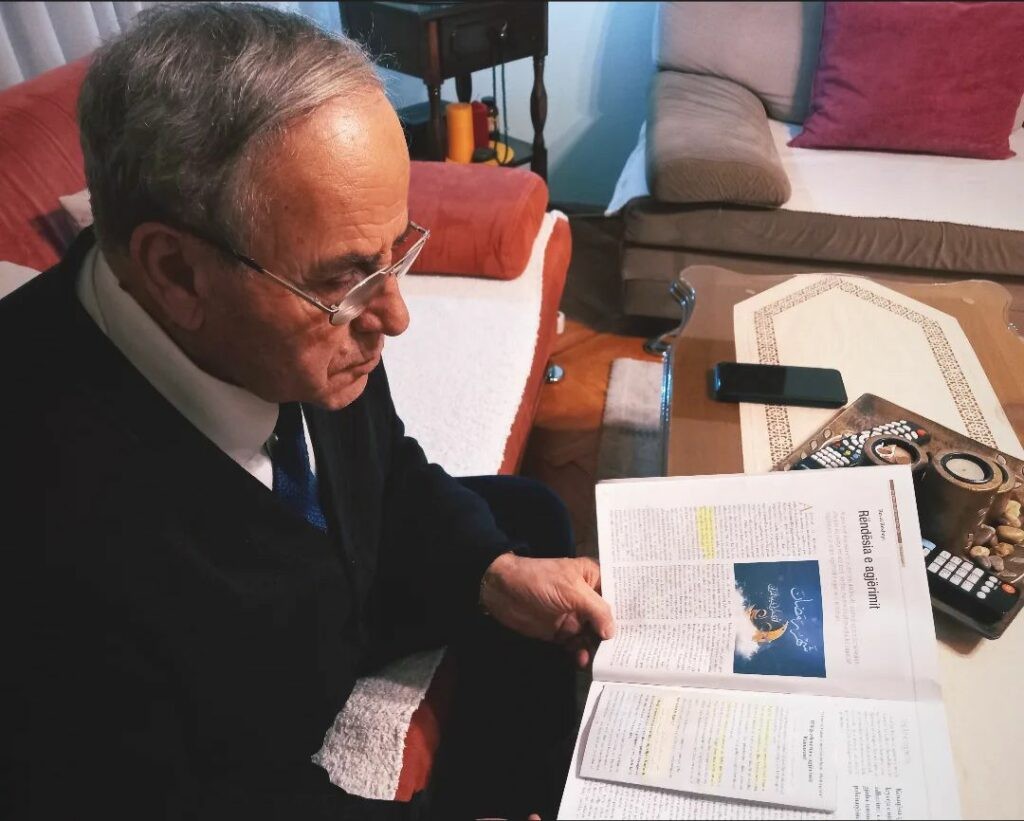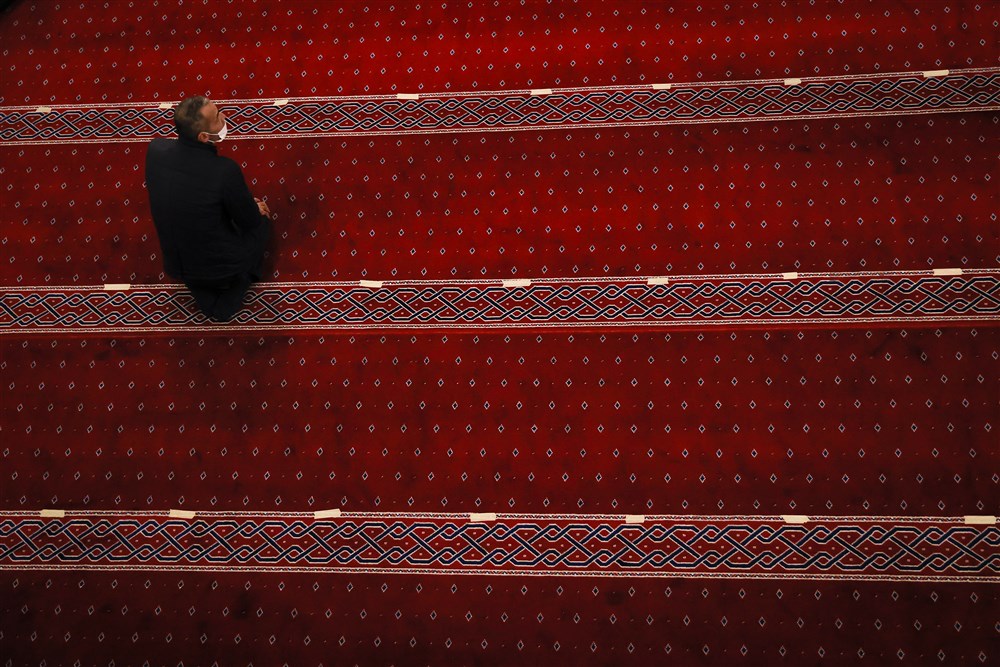This Ramadan becomes the 72nd that Muhamet Iljazi fasts.
As an 8-year-old he would fast daily until noon. Then, for seven decades in a row, today 80-year-old Muhamet Iljazi from Gjakova fasts until the minaret is illuminated in green.
Thursday’s iftar will mark the 72nd Ramadan he fasts. Usually, on such a day, the dinner table is more crowded than on other days.
Born and raised in a religious way, as Iljazi describes his upbringing, he begins to look back on the past with nostalgia reminiscing about half-fasting as a child, during the month of Ramadan.
Throughout these years, hungry at noon, on a full stomach at midnight, but each time with a fulfilled soul, he has experienced Ramadan in all the seasons.

Photo courtesy of Muhamet Iljazi.
The aroma of the food of iftar is not the only thing that takes over his house for a month. The religious spirit also prevails inside his house, where calendars, household furniture and religious books symbolizing Islam and the holy month of Ramadan are placed across it in different corners.
In addition to his age, there are also various memories that Iljazi carries on his shoulders when he nostalgically recounts the days of his childhood and fasting during those times.
“If we compare the past and present times, [I could say that back then] the month of Ramadana was a great pleasure for us, the month of fasting. When still young, we would only fast for half the day, whereas at an older age, we fasted the whole day”, says the 80-year-old man.
For him, the desire to fast was ingrained since childhood and has remained indelible throughout his life, until today.
“Like every child, we longed to wake up for suhur, but we were not able to fast during the day. Still, however, we wanted to be like our parents and like those who were older,” Iljazi confesses to BIRN.
“Well, our parents used to tell us ‘you should fast for half the day and complete the other half tomorrow; we will then add it up thus making it a full day’. This is how they tricked us. We fasted for half the day, then ate normally, and continued fasting the the next day”, says Iljazi when describing the fasting process he followed as an 8-year-old child.
Gazing outside of the window, Iljazi points to the street of the neighborhood where he and his childhood friends used to play and run during the holy month of Ramadan, as a way to make time go faster.
“Our greatest joy was when our parents went to the mosque. We would then go out into the streets together with our friends, play our games, going from one neighborhood to the other. These memories are never forgotten. After running around, we used to climb over the mosque. My greatest wish was to see the city from above”, he says.
Among the scraps of memories, what stands out for the 80-year-old are the days when he and his neighborhood friends killed time by collecting fruits to eat for iftar.
“We used to go out to Çabrat to pick plums, cherries, blackberries as well as every other fruit at hand, but after iftar we were full and couldn’t eat them. We just did it out of desire because we thought that after the meal we would be able to eat them”, he confesses with a smile, as multiple memories flood back.
Now, 70 years later, Iljaz hears about the beginning of iftar over the phone, through the voice of the imam and or in other ways.
Nevertheless, according to him, the traditional way the arrival of iftar was announced remains better.
“At that time, there were no lights in the mosque, and there were no loudspeakers, so someone had to come out to watch out for the moment the imam would appear throwing the flag and announcing the iftar. So, we would count down the minutes to that moment, and it was a great pleasure, great joy”, explains Iljazi.
Waking up at sahur was also special to him.
“The greatest pleasure was when a man would come out on the streets with a drum, to wake us up [for sahur]. It was a joyful occasion, but now that technology has advanced, we have the telephone, so we all wake up at the same time to the alarm”.
“It’s a lot easier now, but it’s not as fun as it used to be.”
Fasting amid religious harmony and the challenges of the communist system
Gjakova is one of the cities where there is interreligious harmony. Besides the Muslim community, among other beliefs, there is also the Christian one.
For Ilijaz, the month of Ramadan does not only bring memories among the citizens of the Islamic faith, but the moments of understanding by the Christian residents are also engraved on his mind.
“There were good times. Even those who were Christians did not smoke and did not eat on the street during Ramadan, so that we would not see them. They were educated with their religious spirit”, says the elderly man, adding that nowadays this happens less.
For 45 consecutive years, Kosovo was governed by the communist system, which lasted from 1945 to 1990. During that period, the proclamation of religion in public institutions and schools was not something that could happen very naturally.
For Muhamet Iljazi, who spent most of his productive years working as a teacher, those days were challenging.
He recounts how he had fasted while serving as a teacher at the “Hajdar Dushi” gymnasium in Gjakovë during the ‘60s.
Iljaz notes that practicing religion openly has risked bringing him trouble.
“If they found out that you are fasting, they would fire you from work”, he says.
Thus, he was forced to find a way to do it secretly.
“Usually, when I was at school, at the gymnasium when I started working at the age of 23, in 1966, they [the colleagues] used to drink tea and coffee, so I had to hide or go out during the break, pretending to have work to do. But this would not pass every day”, he says.
Back then, he had found an interesting way to tackle such issues so as to avoid problems. His solution was a handful of glass beads which he secretly used.
“I found a way by using the beads, that we used to call porta. When I left the classroom during the longer break, I kept a bead in my mouth. When my colleagues invited me to ‘join them for coffee or tea’, I told them ‘no’, [explaining] ‘I just took a candy’. This way, they did not notice [anything off about] me.”

A Kosovar Muslim attends a morning prayer session to celebrate Eid al-Fitr, which marks the end of Ramadan, at the Grand Mosque in Pristina, Kosovo, 13 May 2021. Photo: EPA-EFE/VALDRIN XHEMAJ
Military service
Only a few years later, another challenge during the month of Ramadan for Iljaz became the military service.
“In 1968 I joined the army, I was in Bosnia. When it was Ramadan time, there was a 90 per cent majority of Serbs, [who held positions as] captains and officers. Breakfast, lunch and dinner were served at specific times. The horn would sound. If you didn’t have a meal, you were left without a meal. Then, when I had to eat sahur, I had nowhere to get bread from or [a place] to prepare it.”
So, the meal schedule, the overall conditions and numerous physical activities that had to be exercised on a daily basis, had made it impossible for the then-25-year-old to fast.
“I was thinking of eating dinner and staying only with the dinner meal, but the next day we would have to exercise, running up and down. The body couldn’t take it for 24 hours without food.”
Iljazi also remembers when Ramadan would be during the summer months and the high temperatures made fasting difficult. He overcame this problem thanks to his strong will ingrained since his childhood.
“When Ramadan came in the summer, we had a hard time. We were careful as children not to run too much, not to play with the ball, or go for a swim. Winter has been easier because the days were shorter, but the strong will opens the iron gates, knowing that God’s reward is great” – concluded Iljazi in his interview with BIRN.





